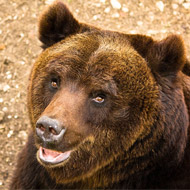
WWF Italia calls for a review of capture protocols
The death of a rare brown bear at a nature reserve in Italy has been described by the WWF as 'a tragic fatality’.
The Marsican brown bear died during an authorised capture operation at the Abruzzo, Lazio and Molise nature reserve.
Initial reports suggested that the bear died from suffocation as a result of too much anaesthetic. However, an investigation led by WWF Italia has since revealed it was suffering from ‘serious diseases’ that could not have been foreseen by staff.
According to media reports, the park rangers had not intended to capture the bear that died. Instead, they had been aiming to fit a radio collar to a bear named Mario, which had been causing trouble in a nearby village and deemed a risk to its inhabitants.
WWF Italia is now calling for a review of protocols to minimise the need for capture. This includes actions to avoid making bears confident, such as not leaving food near inhabited areas and gathering fruit from trees. The organisation is also calling for new protected areas and the creation of safe corridors between protected areas that already exist.
Native to the Apennine Mountains of Italy, the Marsican bear is listed as critically endangered on the IUCN Red List. In 1923, the Abruzzo, Lazio and Molise nature reserve was created to specifically protect the bears, of which only 40 to 50 individuals remain.
Image (C) Marco Tersigni.



 The Animal and Plant Health Agency (APHA) has updated its online reporting service for dead wild birds.
The Animal and Plant Health Agency (APHA) has updated its online reporting service for dead wild birds.